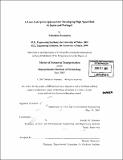A lean enterprise approach for developing high speed rail in Japan and Portugal
Author(s)
Iwamura, Nobuhiro
DownloadFull printable version (16.77Mb)
Other Contributors
Massachusetts Institute of Technology. Dept. of Civil and Environmental Engineering.
Advisor
Joseph M. Sussman.
Terms of use
Metadata
Show full item recordAbstract
This thesis explores and evaluates the application of the lean enterprise concept to the expansion and development of the high speed railway industry in Japan. The basic idea of the lean enterprise is increasing value-added processes, eliminating waste, and creating equitable value delivery throughout the enterprise. It also focuses on both radical change and continuous improvement. The application of the lean enterprise concept to the railway industry, a service industry, is the first such example. Therefore, the aim is not only to consider the future strategy of the new high speed rail in Japan, but also to assess whether lean enterprise architecting is applicable to the new construction projects of railway industry. First, this thesis looks back at the history of the Japanese railway system and examines the details of the present Shinkansen railway system. It then makes an international comparison with the United Kingdom and German railway systems to be utilized it in the later analysis. Next, the Enterprise Value Stream Mapping and Analysis (EVSMA) is applied to the new extended Shinkansen projects in Japan, providing suggestions that for strategy that can offer the projects some advantages from the lean enterprise perspective. (cont.) The results suggest that the lean enterprise concept is very suitable for the development of railway industries to enhance the total enterprise performance, because of the need for large capital investment and its complexity and high technology. Some barriers exist, such as political interventions, but if the lean approach is applied by the representatives of existing stakeholders, it will greatly help the slow growth Japanese railway industry to prosper. The lean enterprise concept is further tested and validated through application to Portugal's high speed rail construction project. An appropriate strategy for construction of high speed rail, derived from this analysis, generates some useful ideas for the future.
Description
Thesis (S.M.)--Massachusetts Institute of Technology, Dept. of Civil and Environmental Engineering, 2007. Includes bibliographical references (p. 164-166).
Date issued
2007Department
Massachusetts Institute of Technology. Department of Civil and Environmental EngineeringPublisher
Massachusetts Institute of Technology
Keywords
Civil and Environmental Engineering.